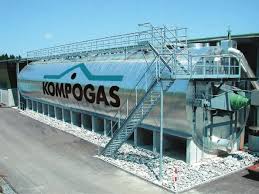Hitachi Zosen Inova to Build and Operate Kompogas® Plant
to Turn Jönköping’s Organic Waste into Vehicle Fuel

Hitachi Zosen Inova is to build Scandinavia’s second Kompogas® facility in Jönköping,
Sweden. It will use a dry fermentation process to convert around 40,000 metric tons of
organic waste a year into fuel for buses and cars, and high-grade fertilizers. The new
installation will replace an existing wet fermentation facility, assuring the future of organic
waste treatment, renewable fuel production, and jobs in the region.
The Swedish municipality of Jönköping has approved the sale of the existing wet fermentation
facility (JEBIO1) to the Swiss company Hitachi Zosen Inova (HZI) and its local partner and
enabler JES & Partners AB. This will enable HZI to design, finance, build, and operate a new
Kompogas® dry fermentation plant (JEBIO2) in the south of the city. “We’re happy to have come
up with this solution. HZI will continue to ensure the sustainable treatment of local household
kitchen and green waste, produce renewable fuel, and at the same time secure local jobs,”
explains Fridolf Eskilsson, Director and Managing Director of Jönköping Energi AB, the current
owner of JEBIO1.
Helping Achieve Carbon Neutrality
“Sweden leads the world in terms of its efforts to establish a carbon-neutral economy,” says
Andres Kronenberg, Head of Business Development and Member of the Executive Board at HZI.
“We are proud to be the supplier of the first-class Kompogas® Anaerobic Digestion (AD) and
BioMethan upgrading technologies that literally enable the regional public transport system to be
run on kitchen and green waste. This plant will serve as a fine example of our company’s
contribution to a carbon-free economy.”
In the future, the two Kompogas® steel digesters will process up to 40,000 metric tons of organic
waste a year to produce biogas, which will be upgraded and compressed to a renewable
transport fuel. “Unlike the existing wet AD plant, in the dry fermentation process one of the key
products is compost, a valuable soil conditioner,” says Lukas Heer, HZI’s Project Development
Manager, underscoring the benefits of the Kompogas® technology. “As no additional water is
introduced into the process, the liquid fertilizer produced from dewatered digestate is also much
richer in nutrients,” he adds.
Local Business Benefits
The compost will be passed back to the Municipality of Jönköping for its own use, while the liquid
fertilizer will be sold to local farmers. The 35 GWh of biogas produced every year will be
converted into high-grade biomethane and sold in the form of compressed natural gas (CNG) as
carbon-neutral vehicle fuel locally.
HZI will take charge of operating JEBIO1 at the end of 2018 until the start-up of JEBIO2 by the
end of 2020. Following that, the old installation will be dismantled. After Högbytorp, to the north
of Stockholm, Jönköping is already HZI’s second Kompogas® plant in Sweden.



